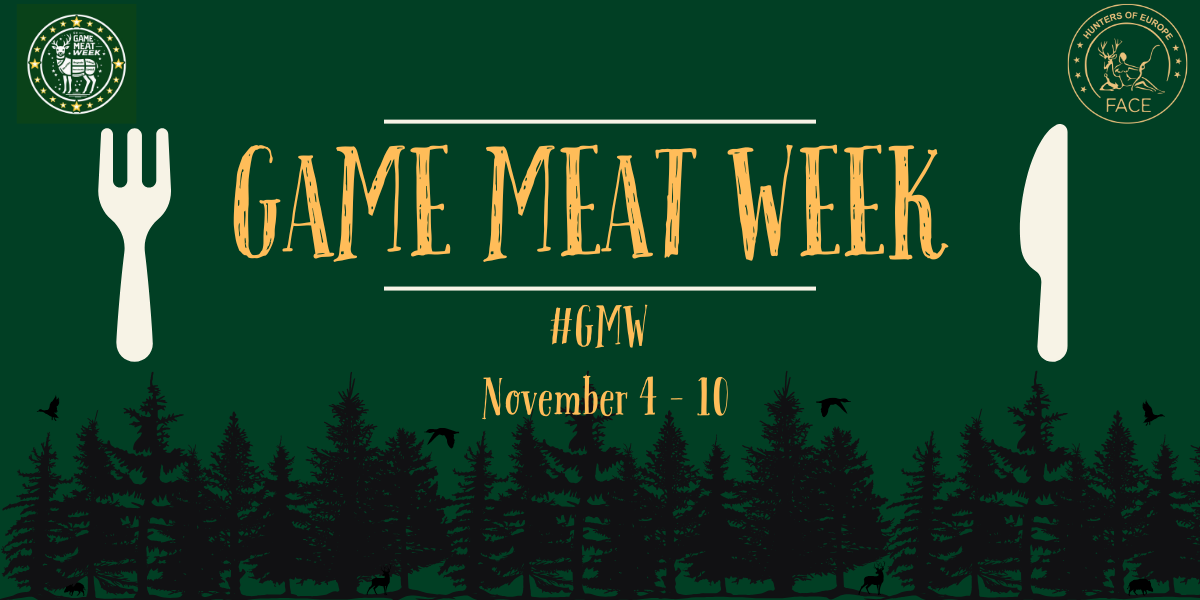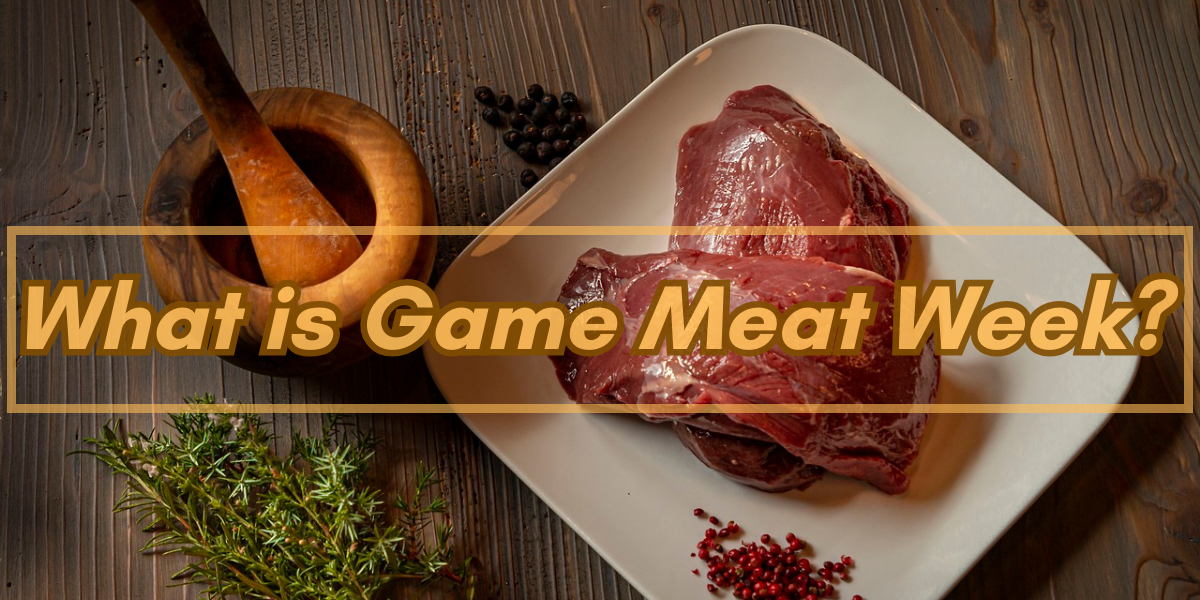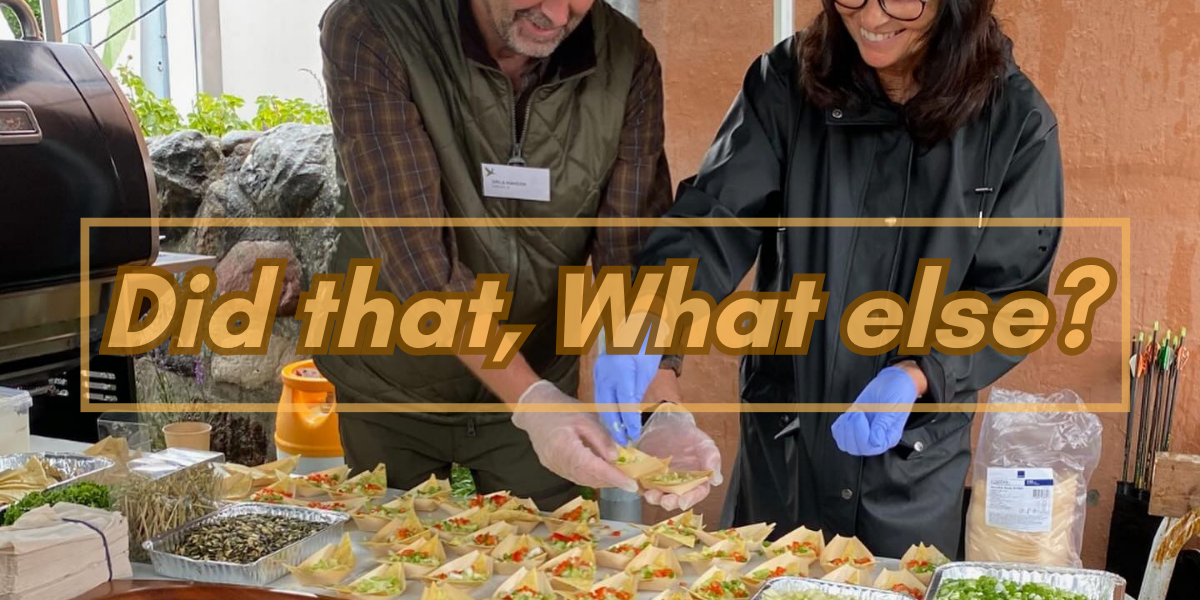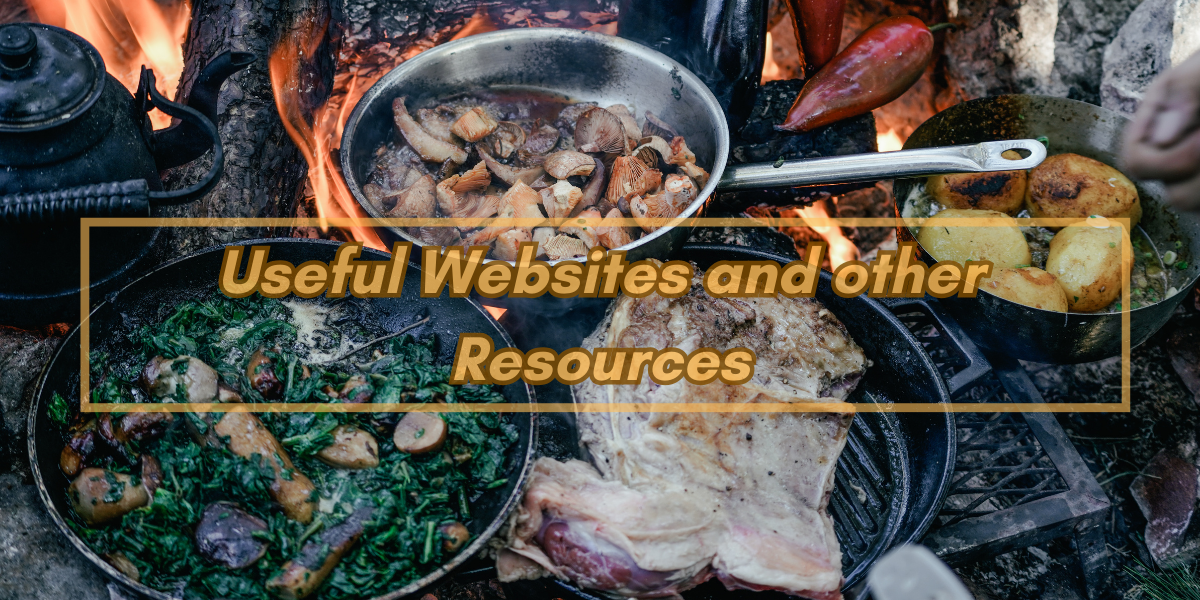Welcome to Game Meat Week:
Celebrating Sustainable, Healthy Food Worldwide
Nov 4th –11th

Welcome to Game Meat Week:
Celebrating Sustainable, Healthy Food Worldwide
Nov 4th –11th

o What is Game Meat Week?
Game Meat Week is an annual event that brings together food lovers, conservationists, and hunters from around the world to celebrate the benefits of game meat consumption. Discover the nutritional, environmental, and cultural value of eating wild meat.

o Mission Statement
Game Meat Week is a global celebration of the unique benefits that wild game meat offers, from promoting sustainable and ethical food choices to supporting wildlife conservation. Our mission is to:
Celebrate Game Meat: Showcase the diversity and deliciousness of game meat, highlighting its rich flavors, nutritional value, and cultural significance across the world.
Promote Sustainability: Raise awareness of how responsible hunting and game meat consumption contribute to biodiversity, ecosystem health, and sustainable food practices, reducing the reliance on industrialized meat production.
Educate the Public: Provide information about the positive role ethical hunting plays in wildlife management, and the importance of game meat in supporting conservation efforts that protect habitats and species.
Showcase Cultural Diversity: Highlight how game meat is enjoyed in various countries and cultures, sharing traditional and modern recipes that reflect the global culinary heritage of wild food.
Game Meat Week aims to connect chefs, hunters, conservationists, and food enthusiasts worldwide, encouraging a broader understanding and appreciation of game meat as a sustainable, healthy, and ethical choice.

Be part of the global movement celebrating game meat, sustainability, and conservation! Game Meat Week (Nov 4–11) offers plenty of ways for you to participate, whether you’re a passionate foodie, a conservation advocate, or someone interested in ethical eating. Here’s how you can join us:
o Get Involved
Help spread the word by sharing your love for game meat on social media! Whether you’re preparing a delicious game meat dish, attending an event, or supporting ethical hunting practices, we want to hear from you.
Use Our Hashtags: Tag your posts with #GameMeatWeek, #GMW, and #SustainableFood to join the conversation.
Share Our Posts: Follow us on Instagram, Facebook, and X (@GameMeatWeek) and share our updates, recipes, and sustainability facts with your followers.
Post Your Own Content: Share your favorite game meat recipes, dining experiences, and thoughts on sustainable food. Don’t forget to tag us!
By joining Game Meat Week, you’re not only celebrating a delicious and nutritious food choice, but you’re also supporting sustainable hunting practices, conservation efforts, and the health of our planet. Get involved, spread the word, and make this week an incredible celebration of game meat!

o Get Involved
Throughout Game Meat Week, you can explore exciting events, cooking demos, tastings, and more! Find an event near you or even host your own.
Game Meat Week is the perfect opportunity to get creative in the kitchen. Discover new ways to prepare wild game dishes and bring a taste of nature to your table.
By supporting Game Meat Week, you are helping raise awareness of the important role game meat plays in wildlife conservation and sustainable food systems.
Sign up for our newsletter to receive all FACE updates on events, recipes, conservation efforts, and more. Be the first to know about exclusive Game Meat Week content and future campaigns!

o Background: The Origins of Game Meat Week
Game Meat Week began as a grassroots initiative, driven by a community of hunters, chefs, and conservationists who wanted to raise awareness about the unique benefits of game meat. Over the years, this annual celebration has grown into a global event, connecting people from different cultures and backgrounds with a shared passion for sustainable food practices and ethical wildlife management.
The first Game Meat Week was launched in [Insert Year] to highlight the importance of game meat in supporting biodiversity and the role it plays in traditional diets around the world. It was created to bring attention to how game meat can be a responsible alternative to industrially produced meat, benefiting both the environment and human health.

o Why Game Meat? More than meats the eye!
Game meat is more than just a culinary choice—it’s a sustainable, healthy, and environmentally responsible option that connects people with nature and promotes wildlife conservation. Here are some key reasons why game meat is a great addition to your diet:
1. Health Benefits 
Lean and Nutrient-Rich: Game meat, such as venison, wild boar, and pheasant, is typically leaner than farm-raised meats, containing lower levels of fat and cholesterol. It’s also packed with essential nutrients like protein, iron, and omega-3 fatty acids, making it a healthy choice for those who care about their nutrition.
Free from Antibiotics and Hormones: Unlike industrially farmed meats, wild game is naturally free of antibiotics, hormones, and artificial additives, offering a more natural, clean source of protein.
High in Vitamins and Minerals: Game meat is rich in vitamins like B12, B6, and niacin, as well as minerals such as zinc, iron, and selenium, all of which are important for maintaining overall health and energy levels.
2. Sustainability and Environmental Impact 
Low Carbon Footprint: Wild game animals are not raised on industrial farms, meaning their impact on the environment is significantly lower than that of conventionally raised livestock. Eating game meat helps reduce the demand for intensive animal farming, which is often linked to habitat destruction, deforestation, and excessive greenhouse gas emissions.
Supporting Biodiversity: Ethical hunting practices help manage wildlife populations, ensuring that ecosystems remain balanced. Overpopulation of certain species, like deer, can lead to habitat degradation. Hunting and consuming game meat support conservation efforts by maintaining healthy wildlife populations and preserving natural habitats.
Zero Waste: Ethical hunters often use every part of the animal, from the meat to the hide and bones, minimizing waste and respecting the life of the animal. By consuming game meat, you are part of a sustainable cycle that values the entire animal.
3. Supporting Conservation 
Wildlife Management: Hunting plays an important role in wildlife management by helping control species populations and preventing overgrazing, which can lead to habitat destruction. By eating game meat, you directly support conservation efforts that focus on protecting natural ecosystems.
Conservation Funding: Hunting licenses, permits, and fees often fund conservation programs that protect endangered species and promote biodiversity. Your choice to enjoy game meat contributes to the financial resources needed for conservation.
A Connection to Tradition and Nature
Cultural Heritage: Game meat is deeply rooted in many cultures around the world. For centuries, it has been a vital source of food for communities, providing not only sustenance but also a sense of connection to nature and tradition. Celebrating game meat is a way to honor these traditions while ensuring they are practiced sustainably for future generations.
Ethical and Respectful: Ethical hunters harvest game with respect for the animal and the environment, often following principles of fair chase and responsible use. Game meat embodies the idea of knowing where your food comes from and appreciating the journey from the wild to your plate.

o Recipes
A collection of recipes, categorized by type of game meat (e.g., venison, wild boar, pheasant).

o Sustainability & Conservation
Why Sustainability Matters
Sustainability is at the heart of Game Meat Week. By promoting the consumption of game meat, we aim to foster a deeper understanding of how sustainable hunting supports ecosystems, wildlife management, and a responsible food system. Wild game is not raised in factory farms or subjected to the environmental degradation associated with industrial meat production. Instead, game meat represents a natural and sustainable food source that is aligned with conservation practices.
Environmental Benefits: Unlike intensive agriculture, which can lead to habitat destruction, deforestation, and high carbon emissions, game meat offers a low-impact alternative. Ethical hunting ensures that only a balanced number of animals are harvested, minimizing harm to ecosystems and reducing overpopulation of certain species that could otherwise cause damage to habitats.
Game Meat and Biodiversity
Game meat consumption plays a crucial role in maintaining healthy ecosystems. Responsible hunting helps control wildlife populations, particularly in areas where natural predators may be absent or in decline. Overpopulation of species such as deer can lead to habitat degradation, overgrazing, and loss of biodiversity. By managing these populations through sustainable hunting practices, hunters contribute to preserving the balance of ecosystems.
Wildlife Management: In many regions, hunting is an essential tool for managing wildlife populations. It prevents overpopulation, which can strain natural resources and lead to negative ecological consequences such as the destruction of plant life and loss of habitat for other species.
Promoting Biodiversity: Healthy, well-managed ecosystems are vital for promoting biodiversity. By controlling certain species’ populations, hunters help preserve the diversity of plant and animal life, ensuring that all species in an ecosystem can thrive. The careful management of game populations also prevents the spread of disease within species, further supporting biodiversity.
Ethical Hunting Practices
At the core of game meat consumption is the principle of ethical hunting. Ethical hunters follow strict guidelines to ensure that their actions have minimal impact on the environment and contribute to the sustainability of wildlife populations. This includes adhering to local laws and regulations, practicing fair chase, and utilizing all parts of the animal to minimize waste.
Fair Chase: Ethical hunters pursue game in a way that respects the animal’s ability to evade capture, avoiding unfair advantages like the use of excessive technology or artificial conditions that make it too easy to hunt.
Minimal Waste: Ethical hunters honor the animal by making full use of the harvested game, ensuring that the meat is consumed, and hides or bones are repurposed. This respect for the animal reflects a deep connection to nature and an understanding of the responsibility that comes with harvesting wild animals.
Conservation Funding: Many hunting activities directly fund conservation through the purchase of hunting licenses, permits, and tags. This financial support is crucial for the protection of habitats, wildlife management, and conservation programs.

o Useful Websites and other Resources
A collection of recipes, categorized by type of game meat (e.g., venison, wild boar, pheasant).
o Contact Us
FACE Initiatives and Campaigns
Please check out the FACE initiatives on their dedicated websites below

Game Meat Week is an annual initiative that brings together food lovers, conservationists, and hunters from around the world to celebrate the benefits of game meat consumption.